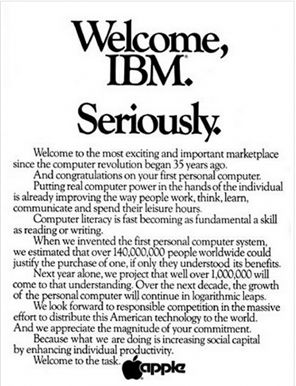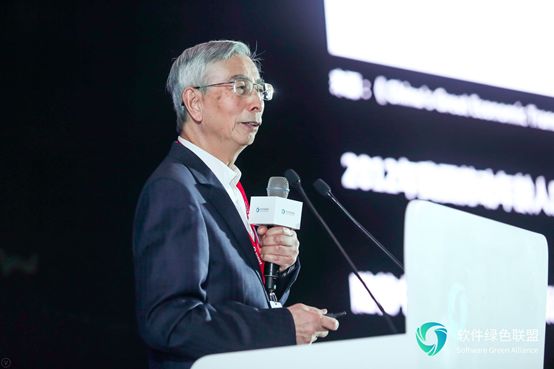Products require an operating system. Microsoft acquired a business and started IBM’s business with its Dos operating system.
The day that IBM released the PC, Bill Gates happened to be in Apple. Apple didn’t pay much attention to this rival. A few weeks later it advertised in the Wall Street Journal: Welcome to IBM, really (Welcome, IBM. Seriously.)

Apple is confident, but it also crackles. The fact is, IBM quickly defeated Apple with its strong supply chain capabilities. 1982: Apple II sold 279,000 units and 240,000 IBM PCs. 1983: Apple II sold 420,000 units and IBM PC 1.3 million units.
This is not a duel worth a big book. In short, Apple found an oasis, shook the flag, and heard that the IBM that came from the news had cleared up Apple. “Business Week” accurately captured the industry’s success. The cover story entitled “PC: The Winner Is … IBM” set the stage for this disparate match.
Jobs was wrong. The immature him and the young apple were not enough to turn things around and overthrow the giant.
Business Week is also wrong. In the PC era, the biggest winner is not IBM.
PC victory? No, it is a victory for the software ecosystem
Bill Gates really has high ambitions. The first cooperation between Microsoft Dos and IBM only collected 50,000 US dollars. This is the beginning of Microsoft’s march from a small business to a giant. Before that, he was one of thousands of software companies. After that, he gradually became the only operating system.
When the media is dancing for IBM’s victory, Bill Gates has seen very clearly that hardware cannot be monopolized and can always be imitated and challenged. But focusing on the operating system, being compatible with the embrace of the chip, and building an ecosystem for the software developers, is a story that is 10,000 times larger than the production of circuit boards.
Sure enough, the road after IBM is gradually hard, and the competition for hardware is extremely fierce. Hewlett-Packard, Acer, Dell, you sing me, but they all use a company’s operating system-Microsoft.
Where can Jobs make it so easy to compromise? Apple responds with innovation. As everyone knows, Jobs invented the personal computer with Apple II and reinvented the mobile phone with iPhone. butc021bb62a4bc_img_000 “data-img-size-val =” 373,174 “>
Windows 95 set off a queue for purchases all night
At the same time, the highly anticipated Macintosh sales continued to plummet, and Apple fell flat and fell into the search for a new operating system. The most humiliating thing was that the then CEO Amelio actually contacted Bill Gates and considered installing Microsoft’s Windows operating system in Apple computers.
Bill Gates, of course, is very eager to reach this cooperation, repeatedly calling Amelio in person. Windows is already the first choice of all PC hardware manufacturers. Looking at the world, Apple is the only rival. If you can install Windows in an Apple computer, it will really dominate the country.
History can’t withstand hypotheses, but you might as well imagine it. If Apple abandons the operating system’s autonomy and control and loses its knowledge and practice of the operating system, then there is a high probability that there will be no subsequent iPhone!
At the critical moment, Jobs, who had been banished by Apple for a full 12 years, suddenly fell from the sky, cutting off this transaction affecting human destiny.
When Jobs stepped onto the board of directors that expelled him that year, things were wrong, and resentment resentment came to his heart, and eventually things went with the wind.
After Jobs showed off his NeXT product, Apple decided to use the operating system that the latter was developing. The way is: Apple acquired NeXT and Jobs returned.
What’s more interesting is that the goals of the acquisition, to be precise, have not been achieved. The NeXT OS system has never really run. But its original object-oriented NeXTSTEP operating system has one of the biggest features: it is very friendly to developers.
It’s not a lawsuit against GUI inventions, nor is it a beautiful machine. Jobs, who was exiled for 12 years, has realized the core of his battle with Microsoft: unite developers and build ecology.
In 1997, at the WWDC (World Developers Conference) after the return, Jobs prepared a set of development tools for software developers around the world to “make your application development 5-10 times faster than other systems. The key point repeatedly emphasized by the entire WWDC is one: come to Apple to develop software, which makes it easier for developers to succeed.
From PC to smartphone
The accumulated disadvantages of many years, of course, it is impossible to turn the tide through a press conference. The effort after Jobs’s return is really a sword for ten years. Ten years later, the iPhone was released.
At that moment, it was also the beginning of Microsoft stepping down from the altar.
The world is bitter for a long time! In addition to high selling prices and huge profits, Microsoft hasState, using a monopoly to combat opponents “is very handy. The most famous is the use of Windows monopoly status, bundled sales of Internet Explorer, directly killed the original industry pioneer and leader Netscape.
Ecology is too important. If you want a healthy and stable software environment, you must firmly control the underlying structure of the operating system in your own hands.
So, the operating system ecology has been a battleground for soldiers since ancient times.
The era of the rise of the PC is also the most prosperous and brilliant era of the Japanese electronics industry. Japanese electronics giants are pushing the operating system developed by themselves-TRON. In the subsequent U.S.-Japan trade war, TRON became the object of severe crackdown by the US trade representative. Under the 301 trade sanctions, any products related to TRON could not be exported to the United States.
The Wall Street Journal has reported that in the 1980s and 1990s, US trade officials regarded TRON as a plot by Japanese politicians to rule the world, and the potential dangers of American computer technology.
The Japanese electronics giant retreated. Finally, under the strict guard of the United States, the Japanese missed the opportunity to own their own operating system.
Bill Gates says success is the worst teacher. When Steve Jobs started the era of smart phones, Windows, the operating system that is accustomed to success and monopoly, quickly lost its brilliant light.
In fact, Microsoft saw the value of mobile devices ten years ago. In 1996, Microsoft introduced Windows CE 1.0, the first mobile device operating system. In response, the six hardware manufacturers Casio, Compaq, Hewlett-Packard, LG, NEC and Philips signed an agreement with Microsoft for the first time to produce mobile devices equipped with CE systems.
In the year that the iPhone was released, the Windows Mobile market share was as high as 42%. However, the ecological construction of WM has not received due attention within Microsoft. In the PC era, Apple was defaced, but now the sword is dull.
As the ecological construction of the iPhone and Android takes shape, Microsoft’s brilliance, like water in the palm of your hand, flows quickly. In just five years, the sales of the iPhone alone have surpassed the combined revenue of Microsoft, Windows, Office, Xbox, Bing, Windows Phone and all other products launched since 1975.
In October 2010, Microsoft improved Windows Mobile to Windows Phone, and officially launched the first generation of operating system that uses finger touch as the interaction logic. It uses a card-like interface and is named WP7. Unfortunately, it has been a long time since major mobile phone brands and software developers have embraced iOS and Android. No one wants to accept Microsoft’s feelings. Spending a huge sum of money on the acquisition of another lost giant, Nokia, was Microsoft’s final doom, but it ended up being a lossMechanism …
There is a fundamental reason behind thousands of reasons: China’s computer industry has a weak foundation-20 years ago, China had few software talents, and the top 20 technology companies in the world did not have the shadow of Chinese companies. Nor can China’s voice be heard in standard deliberations.
In later days, whether it was intentional or not, piracy of Windows everywhere became the last straw that completely crushed China’s basic software industry. Since the operating system is not profitable, you may wish to put the ambitions of the past into the depths of the high cabinet and let them be forgotten.
The fear of uncertainty makes the national industry instinctively choose comfort among comfort and challenge, and maintain in subversion and subversion. Until the spiritual growth of oil completely erodes the willingness to innovate.
“Hard to light but soft” has also become mainstream. After all, hardware is something that can be seen, and software, especially the software ecosystem, is free and ready to use.
Unconsciously, the second decade of the 21st century will also come to an end. When the operating system and software ecosystem are frequently used as tools for the United States to pressure and sanction Chinese companies. China’s industrial world suddenly realized that at a critical time, there was not even a plan B that could be transitioned. The lack of cores and souls was really a pain of the Chinese economy.
In the 20 years of great prosperity in China’s information industry, the once handsome teenagers in the industry gradually gained weight and fat by embracing the tide. Until a great drink, and then suddenly woke up, and sincerely sighed, 20 years ago, he was a schoolboy, and he was once ignited by the dream of creating a Chinese software ecosystem.
Twenty years later, the environment has changed. China accounts for half of the world’s best smartphone brands. China ranks among the top ten ICT companies in the world. Larry Ellison, the founder of Oracle Corps, is full of the dividends of engineers that China is experiencing. Everyone says, you know, China produces more engineers each year than the United States.
The environment hasn’t changed in 20 years. Ni Guangnan is the one who stands firmly at the center to support China’s need for an autonomous and controllable operating system. A few days ago, at the 2019 Software Green Alliance Developer Conference, the 80-year-old old man came in person to stand for the Chinese operating system dream.

At one time, the domestic Android experience was very poor. Due to open source and lack of strong management, various software manufacturers scrambled to push, wake up, and keep running their own apps. As a result, Android phones consumed fast power, had high heat, and had poor experience. In 2016, in order to improve the user experience of the Android system, Alibaba